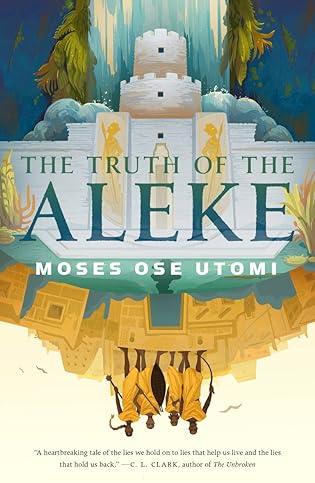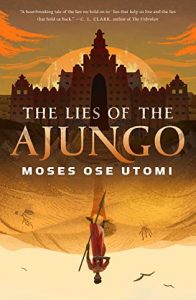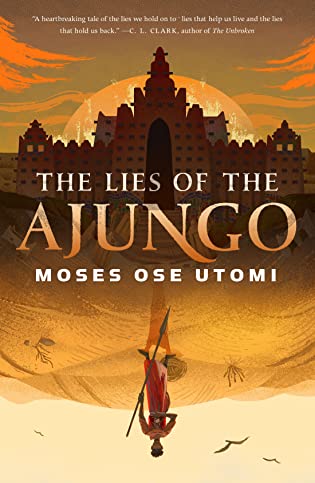 The Truth of the Aleke (Forever Desert, #2) by Moses Ose Utomi
The Truth of the Aleke (Forever Desert, #2) by Moses Ose Utomi Format: eARC
Source: supplied by publisher via Edelweiss
Formats available: hardcover, ebook
Genres: epic fantasy, fantasy
Series: Forever Desert #2
Pages: 112
Published by Tordotcom on March 5, 2024
Purchasing Info: Author's Website, Publisher's Website, Amazon, Barnes & Noble, Kobo, Bookshop.org, Better World Books
Goodreads
Moses Ose Utomi returns to his Forever Desert series with The Truth of the Aleke, continuing his epic fable about truth, falsehood, and the shackles of history.
The Aleke is cruel. The Aleke is clever. The Aleke is coming. 500 years after the events of The Lies of the Ajungo, the City of Truth stands as is the last remaining free city of the Forever Desert. A bastion of freedom and peace, the city has successfully weathered the near-constant attacks from the Cult of Tutu, who have besieged it for three centuries, attempting to destroy its warriors and subjugate its people.
17-year-old Osi is a Junior Peacekeeper in the City. When the mysterious leader of the Cult, known only as the Aleke, commits a massacre in the capitol and steals the sacred God's Eyes, Osi steps forward to valiantly defend his home. For his bravery he is tasked with a tremendous responsibility—destroy the Cult of Tutu, bring back the God's Eyes, and discover the truth of the Aleke.
The Forever Desert series
The Lies of the AjungoThe Truth of the Aleke
At the Publisher's request, this title is being sold without Digital Rights Management Software (DRM) applied.
My Review:
Returning to the Forever Desert long after the events of The Lies of the Ajungo, it seems as if the pendulum of history has swung, the way that such pendulums often do.
Once upon a time, and we know this from that first story, the Ajungo had subjugated all the other cities of the Forever Desert through a mixture of lies and trickery, intimidation and fear. At least until young Tutu exposed the terrible truth at the heart of, not just the Ajungo, but of all the leaders of all the cities who had colluded in that lie in order to maintain their absolute power over their own peoples with the all too able assistance of the Ajungo.
As this story begins, it seems as if that tide has reversed, that the former capital of the Ajungo, who now refer to themselves as Truthseekers and call their city ‘The City of Truth’, have themselves become the oppressed, while the people they once subjugated, the people of the Forever Desert, have banded together into an alliance of aggression against them led by the Aleke.
It is a way that history runs, that the downtrodden rise up against their oppressors but become oppressors in their turn. So we think we understand the situation in the City of Truth when the Aleke come to conquer it, and we feel for young Osi as he becomes the face of his city’s resistance against a terrible enemy.
But just as young Tutu discovered in The Lies of the Ajungo, the truths of both his City of Truth AND The Truth of the Aleke are not what he had been taught as a child. Or what he came to believe as a young man. Or even what he thought was true when he became an ambassador between the two.
Tutu died for his truth. The question at the heart of The Truth of the Aleke is whether or not Osi will be able to live both for and with his.
 Escape Rating A+: Read The Lies of the Ajungo first. It’s a short and absolutely marvelous story of a quest that turns into a myth, and it’s absolutely necessary to read it in order for this equally terrific and fantastic (in multiple senses of the word) second book to reach the depth it needs to in order to get the full effect of the whole thing – at least the whole thing so far.
Escape Rating A+: Read The Lies of the Ajungo first. It’s a short and absolutely marvelous story of a quest that turns into a myth, and it’s absolutely necessary to read it in order for this equally terrific and fantastic (in multiple senses of the word) second book to reach the depth it needs to in order to get the full effect of the whole thing – at least the whole thing so far.
(I’ll be waiting right here when you’ve finished. It won’t take long because the book is short AND I hope you’ll want to race through it as much as I did.)
The Truth of the Aleke is a story that exists on multiple levels in ways that have resonance, both in the story itself and in the now when I’m reading it (It’s mid-October, 2023 so take a look at what was going on in the world at this point in time if the date doesn’t ring any bells and you’ll see what I mean) It’s likely to have just as much resonance in the now when you’re reading this review as that situation has been baked in for even more centuries than the conflict in the Forever Desert and is unfortunately just as amenable to being peacefully resolved – meaning not very much at all.
At first, it seems as if Osi’s journey parallels Tutu’s, and it does to an extent. Both young men – and they are very young and naive when their stories begin – have grown up in a certain place and have been taught to believe certain things and believe that those things are true because that’s the only way they know.
But power corrupts, absolute power corrupts absolutely and everybody lies. That the truth Osi has been taught is not in any way an objective truth is not a surprise to the reader, but the way that he discovers his new truth is a painful stripping away of innocence that we still feel for.
What pushes The Truth of the Aleke beyond The Lies of the Ajungo is that the truths that Osi has to learn are covered in so many layers of lies that the lies and the truths are really the Great Wyrm Ouroboros swallowing its own tail and never end. It’s truths and lies in endless repetition all the way down.
The more layers that Osi discovers, or has thrust upon him – and he admits to himself that he often doesn’t recognize the truth until AFTER it’s bitten him in the ass – the more painful his journey becomes, both figuratively and literally. It’s only at the end that he begins to see, not wisdom but pragmatism. Unless there’s another layer yet to be revealed.
And there probably is.
Some stories are about the journey, and some are about the destination. The Truth of the Aleke has to be about the journey – and it is – because the destination is not yet. If possibly ever. It’s clear from the conclusion – not an ending – of The Truth of the Aleke that the author is not finished with the Forever Desert and that there is at least one more story yet to be told and I’m so very thrilled that the author is already writing it.

 The Lies of the Ajungo (Forever Desert, #1) by
The Lies of the Ajungo (Forever Desert, #1) by